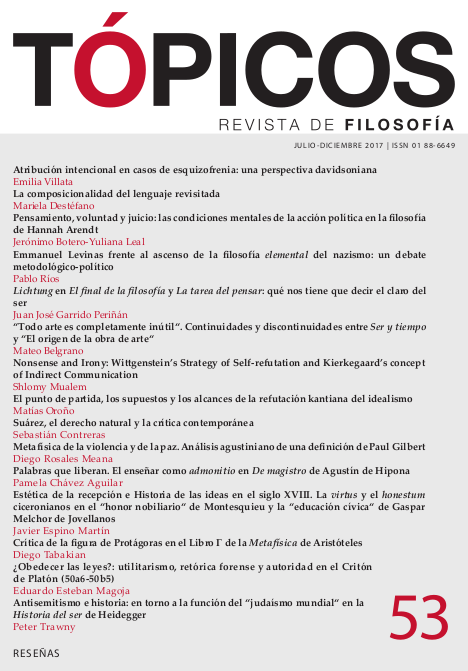Artículos
Nonsense and Irony: Wittgenstein’s Strategy of Self-refutation And Kierkegaard’s Concept of Indirect Communication
Pubblicato 2017-07-01
Parole chiave
Come citare
Mualem, S. (2017). Nonsense and Irony: Wittgenstein’s Strategy of Self-refutation And Kierkegaard’s Concept of Indirect Communication. Tópicos, Revista De Filosofía, (53), 203. https://doi.org/10.21555/top.v0i53.929
Downloads
I dati di download non sono ancora disponibili.
Altmetrics
Citas
Abstract
In his preface to the Tractatus Wittgenstein states that the question of nonsense has to do with drawing the limits of language. Nonsensical expressions go beyond the limits of meaningful language and reside “on the other side” of what can be said. Yet, at the end of the book he declares that his own propositions are, strictly speaking, nonsensical. The present paper aims at analyzing early Wittgenstein’s self-refuting strategy as a mode of transcending the limits of language, comparing his concept of “nonsense” (Unsinn) with Kierkegaard’s view of indirect communication and Socratic irony.
Riferimenti bibliografici
- Anscombe, G. E. M. (1996). An Introduction to Wittgenstein’s Tractatus. Bristol: Thoemmes Press.
- Carnap, R. (1935). Philosophy and Logical Syntax. London: Kegan Paul.
- Creegan, C. L. (1989). Wittgenstein and Kierkegaard. London:Routledge.
- Friedlander, E. (2000). Signs of Sense. Cambridge: Harvard University Press.
- Hong, H.V. (ed.) (1967). Søren Kierkegaard’s Journals and Papers. vol. 1. H. V. Hong and E. H. Hong (trans.) Bloomington and London: Indiana University Press.
- Kierkegaard, S. (1989). The Concept of Irony with Continual Reference to Socrates. H. V. Hong and E. H. Hong. (trans.) Princeton: Princeton University Press.
- ____ (1941). Concluding Unscientific Postscript. D. F. Swenson and W. Lowrie. (trans.) Princeton: Princeton University Press.
- Luckhardt, C. G. (ed.) (1979). Wittgenstein: Sources and Perspectives. Sussex: Harvester Press.
- Manheimer, R. J. (1977). Kierkegaard as Educator. Berkeley: University of California Press.
- McGuinness, B. (ed.) (1979). Wittgenstein and the Vienna Circle: Conversations Recorded by F. Waismann. Oxford: Blackwell.
- ____ (ed.) (1971). Wittgenstein’s Prototractatus. T. Nyberg and G. H. Von Wright, trans., London: Routledge and Kegan Paul.
- McGuinness, B. and Von Wright, G. H. (eds.) (1995). Ludwig Wittgenstein: Cambridge Letters. Oxford: Blackwell.
- Plato. (1997). Complete Works. John M. Cooper. (ed.) Indianapolis/ Cambridge: Hacke Publishing Company.
- Poole, R. (1993). Kierkegaard: The Indirect Communication. Charlottesville: Virginia University Press.
- Rush, R. (ed.) (1981). Ludwig Wittgenstein: Personal Recollections. Oxford: Basil Blackwell.
- Taylor, M. C. (1975). Kierkegaard’s Pseudonymous Authorship. Princeton: Princeton University Press.
- Wittgenstein, L. (1977). Culture and Value. G. H. Von Wright and H. Nyman. (eds.) P. Winch. (trans.) Oxford: Basil Blackwell.
- ____ (1975). Tractatus Logico-Philosophicus. D. F. Pears and B. F. McGuinness. (trans.)London: Routledge & Kegan Paul.
- ____ (1973). Letters to C. K. Ogden with Comments on the English Translation of the Tractatus Logico-Philosophicus. G. H. Von Wright. (ed.) London: Routledge & Kegan Paul.
- ____ (1965). Lecture on Ethics. In Philosophical Review 75.
- ____ (1953). Philosophical Investigations. G. E. M. Anscombe. (trans.) Oxford: Basil Blackwell.






